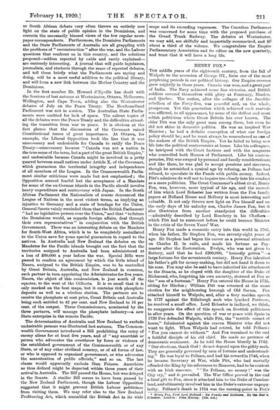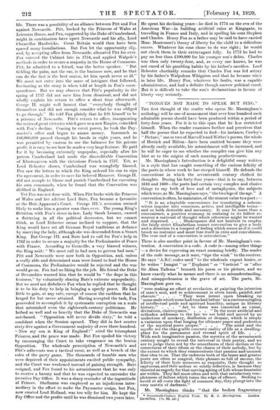HENRY FOX.*
THE middle years of the eighteenth century, from the fall of Walpole to the accession of George III., form one of the most perplexing periods in our political history. Our Empire oversea grew mightily in those years. Canada was won, and a great part of India. The Navy achieved some fine victories, and British soldiers covered themselves with glory at Fontenoy, Minden, and Quebec. The nation, after the collapse of the Jacobite rebellion of the Forty-five, was peaceful and, on the whole, prosperous. Yet this generation which achieved such marvels was afflicted, to all appearance, by some of the dullest and most selfish politicians whom Great Britain has ever known. The elder Pitt was the only great man among them, but even he did not shine in domestic politics. He was an inspired War Minister ; he had a definite conception of what our foreign policy should be ; and he must always be remembered as one of the makers of the British Empire. Yet he failed to bring new life into the political controversies at home. Like his colleagues, he intrigued with the Court factions and with the magnates who controlled both Houses of Parliament. Like his contem- poraries, Pitt was swayed by personal and family considerations; and like them, he was glad to accept pensions and sinecures, though he astonished a cynical age by refusing, as Pelham had refused, to speculate in the Funds with publio money. Indeed, Pitt's admirers do well not to inquire too closely into his conduct as a mere politician. The Great Commoner's ablest rival, Henry Fox, was, however, more typical of his age, and the memoir of him which Lord Bchester has written from the Fox family papers at Holland House and Melbury is most interesting and valuable. It not only throws now light on Fox himself and on the early days of his unlucky son, Charles James Fox, but it also illustrates from another standpoint the difficulties —admirably described by Lord Rosebory in his Chatham— which Pitt had to surmount before he could become 'Minister in the crisis of the Seven Years War.
Henry Fox made a romantic entry into this world in 1705, when his father, Sir Stephen Fox, was seventy-eight years of age. Sir Stephen had begun his career as a personal attendant on Charles H. in exile, and made his fortune as Pay- master after the Restoration. Evelyn, who was not given to flattery, said that he had £200,000, "honestly gotten "—a large fortune for the seventeenth century. Henry Fox inherited his father's gift for money-making, but did not hand it down to his sons. Fox may also be said to have inherited his attachment to the Stuarts, as he eloped with the daughter of the Duke of Richmond, who, forgetting his own ancestry, stormed at Fox as the " son of a footman." Henry Fox entered the House in 1735, sitting for Hindon ; William Pitt was returned at the same election for the neighbouring borough of Old Sarum. Fox attached himself to Walpole, and, after a fiery maiden speech in 1737 against the Edinburgh mob who lynched Porteous, he received a small office. Lord Uchester is inclined, we think, to exaggerate the effect of this speech on Scottish politicians in after years. On the question of war or peace with Spain in 1739 Fox defended Walpole, while Pitt, the " terrible cornet of horse," fulminated against the craven Minister who did not want to fight. When Walpole had retired, he told Pelham: " Fox you cannot do without." And Fox remained to the end a faithful disciple of his old chief. He made no pretence of democratic sentiment. As he told the House bluntly in 1742: " Our elections, thank God ! do not depend upon the giddy mob. They are generally governed by men of fortune and understand- ing." He was loyal to Pelham, and had his reward in 1746, when he became Secretary at War, while Pitt, who had mortally offended the King by his references to Hanover, had to be content with an Irish sinecure. " No Pelham, no money f' was the City cry," and it prevailed. The War Office proved in the end a fatal gift to Fox, since it attached him to the Duke of Cumber. land, and ultimately involved him in the Duke's extreme unpopu. larity. Pelham's death in 1754 was the turning-point in Fox's • Henry Paz. First Lord Holland : Ms Family and Relation. By the Bad a: Ilchester. London : John Murray. [826. net.J life. There was a possibility of an alliance between Pitt and Fox against Newcastle. Pitt, backed by the Princess of Wales at Leicester House, and Fox, supported by the Duke of Cumberland, might in combination have upset Newcastle and his ally, Lord Chancellor Hardwicke. Great Britain would then have been spared many humiliations. But Fox let the opportunity slip, and, by accepting office from Newcastle, alienated Pitt for ever. Fox entered the cabinet late in 1754, and applied Walpole's methods in order to secure a majority in the House of Commons. Pitt, he admitted to a friend, was the better speaker. " But tickling the palm, not the ear, is the business now, and he that can do the first is the best orator, let him speak never so ill." We must not enter into the maze of intrigues that followed, fascinating as the story is when told at length in Fox's corre- spondence. But we may observe that Pitt's popularity in the spring of 1757 did not save him from dismissal, and did not wholly explain his return to office a short time afterwards. George II. might well lament that " everybody thought of themselves and did not enough consider what he was obliged to go through." He told Fox plainly that he felt himself to be a prisoner of Newcastle. Pitt's return to office, inaugurating the series of great victories which gave us a new Empire, coincided with Fox's decline. Ceasing to covet power, he took the Pay- master's office and began to amass money. Inasmuch as £46,000,000 passed through his hands in eight years, and he was permitted by custom to use the balances for his private profit, it is easy to see how he made a very large fortune. He paid for it by becoming extremely unpopular, especially after his patron Cumberland had made the discreditable Convention of Klosterzeven with the victorious French in 1757. Yet, as Lord Ilchester shows, Cumberland was wrongfully blamed. Fox saw the letters in which the King ordered his son to sign the agreement, in order to save his beloved Hanover. George H. did not scruple to blame and punish Cumberland for executing his own commands, when he found that the Convention was disliked in England.
Yet Fox was not done with. When Pitt broke with the Princess of Wales and her adviser Lord Bute, Fox became a favourite at the Heir-Apparent's Court. George In.'s accession seemed likely to make him a greater man than ever. The young King's flirtation with Fox's sister-in-law, Lady Sarah Lennox, caused a fluttering in all the political dovecotes, but we cannot think, as Lord Ilchester seems inclined to suppose, that the King would have set all German Royal traditions at defiance by marrying the lady, although she was descended from a Stuart King. But George HI. and Bute had to call for Fox's help in 1762 in order to secure a majority for the Preliminaries of Peace with France. According to Grenville, a very biassed witness, the King said : We must call in bad men to govern bad men." Pitt and Newcastle were now both in Opposition, and, unless a really able and determined man were found to lead the House of Commons, the Preliminaries would be rejected and the war would go on. Fox had no liking for the job. His friend the Duke of Devonshire warned him that he would be " the dupe in this business," by voluntarily sharing Bute's extreme unpopularity. But we need not disbelieve Fox when he replied that he thought it to be his duty to help in bringing a speedy peace. He had little to gain, at any rate, except of course the earldom that he longed for but never attained. Having accepted the task, Fox proceeded to accomplish it by systematic corruption on a scale that astonished even the eighteenth-century politicians. He bribed so well and so heavily that the Duke of Newcastle was outclassed. " Opposition will never divide sixty," he told a confidant when the Session opened. They did in fact muster sixty-five against a Government majority of over three hundred. " Now my son is King of England !" cried the triumphant Princess, and the peace was made. But Fox spoiled his victory by encouraging the Court to take vengeance on the beaten Opposition. The wholesale proscription of NeweaStle's and Pitt's adherents was a tactical error, as well as a breach of the rules of the party game. The thousands of humble men who were deprived of their appointments excited public syMpathy, and the Court was weakened instead of gaining strength. Bute resigned, and Fox found to his astonishment that he was only to receive a barony and that he was expected to surrender the lucrative Pay Office. It was a sharp reminder of the ingratitude of Princes. Shelburne was employed as an injudicious inter- mediary in the effort to make the Paymaster resign, but Fox,
now created Lord Holland, was too wily for him. He kept the Pay Office and the profits until he was dismissed two years later. He spent his declining years--he died in 1774 on the eve of the American War—in building artificial ruins at Kingsgate, in travelling in France and Italy, and in spoiling his sons Stephen and Charles. Henry Fox as a father may be said to have carried Mme. Montessori's theory of liberty for the child to a ridiculous excess. Whatever his sons chose to do was right ; he would not check them in their extravagant folly. In 1773 he had to pay no less than £100,000 for his younger son's debts. Charles was then only twenty-four, and, as every one knows, he was not cured of his gambling habits by his father's sacrifice. Lord Ilchester charitably remarks that Charles Fox was led astray by his father's Walpolean Whiggism and that he became wiser in later life. Henry Fox, whatever his faults, was a capable administrator, and had a definite though narrow political creed. But it is difficult to take the son's declamations in favour of liberty very seriously.



































 Previous page
Previous page